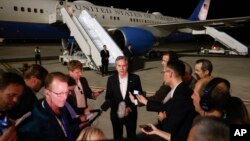U.S. Secretary of State Antony Blinken said Monday leaders in the Middle East are determined to prevent the Gaza conflict from spreading and that there is broad recognition on the need to "chart a political path forward for the Palestinians."
"The West Bank and Gaza should be united under Palestinian-led governance," Blinken told reporters at Al Ula airport in Saudi Arabia.
"The future of the region needs to be one of integration, not division and not conflict," said Blinken, adding "for that to happen, we need to see the establishment of an independent Palestinian state."
In a statement following talks with Blinken, Saudi Arabian Crown Prince Mohammed bin Salman underscored the importance of halting military operations in the Gaza Strip and the need to create conditions for restoring peace and stability. Local media have reported that this effort aims to ensure the Palestinian people obtain their legitimate rights and achieve a just and lasting peace.
On Monday, Blinken met with the United Arab Emirates President Sheikh Mohammed bin Zayed Al Nahyan and senior officials from Saudi Arabia before heading to Israel.
The chief U.S. diplomat said he would push Israeli officials for more humanitarian aid to Gaza and more protection for civilians. He also plans to discuss efforts to secure the release of the remaining hostages and how to ensure the conflict does not spread to other parts of the region.
When asked about the U.S.-led talks to normalize the relationship between Saudi Arabia and Israel, Blinken stated that there is "a clear interest" in Saudi Arabia, as well as in the region, in pursuing that goal but "it will require that the conflict end in Gaza, and it will also clearly require that there be a practical pathway to a Palestinian state."
Saudi Arabia has paused diplomatic talks to normalize ties with Israel amid the military conflict between Hamas militants and Israeli forces.
After an Israeli airstrike killed a key Hezbollah commander in southern Lebanon on Monday — the latest sign of a possibly widening conflict in the Middle East — Blinken told reporters it's clearly not in the interest of Israel, Lebanon, or Hezbollah to see an escalation outside Gaza and "the Israelis have been very clear with" the U.S. that "they want to find a diplomatic way forward."
Hezbollah has identified the commander as Wissam al-Tawil. Last week, senior Hamas official Saleh al-Arouri was killed in a drone strike in Beirut. Both Hamas and Hezbollah are backed by Iran, whose militant allies in Syria, Iraq and Yemen have also been carrying out longer-range attacks against Israel.
In meetings Sunday with Jordan King Abdullah II and Qatari Emir Sheikh Tamim bin Hamad Al Thani, the top U.S. diplomat spoke of the need for Israel to curb civilian casualties during the Israeli-Hamas war in Gaza and significantly increase the amount of humanitarian aid reaching famished Palestinians in Gaza.
But the U.S. has continued to support Israel in refusing Arab demands for a cease-fire to halt the fighting in the three-month war. Israel has vowed to continue the war until it believes the threat of future Hamas attacks has been eradicated and the militant group no longer controls Gaza, a narrow strip of territory along the Mediterranean Sea.
Jordan's royal court said King Abdullah "warned of the catastrophic repercussions" of Israel's war in Gaza against Hamas while calling on the U.S. to press for an immediate cease-fire. Israeli and U.S. officials have said they believe that a cease-fire would only allow Hamas to be able to regroup in its fight against Israeli forces.
While in Amman, Blinken also visited a World Food Program warehouse where trucks are loaded with aid for famished Palestinians in Gaza.
"The efforts right here to collect and distribute food to people in need are absolutely essential," Blinken said. "The United States has worked from day one to open access routes into Gaza."
"We continue to work on that every single day, not only to open them but to multiply them, to maximize them and to try to get more assistance, more effectively," he said. "We're determined to do everything we possibly can to ameliorate the situation for the men, women and children in Gaza."
Israel began its military campaign to wipe out Hamas after Hamas fighters crossed into southern Israel on October 7. Israel said about 1,200 people were killed and about 240 captives taken in the terror attack.
Gaza health officials say close to 23,000 Palestinians, a large percentage of them women and children, have been killed in Israel's military offensive in the Gaza Strip.
The United States has stated its opposition to forcibly removing Palestinians from Gaza. The U.S. is also working on a postwar road map for the Palestinian territories.
"Gaza cannot, once again, serve as a launching pad for terrorist attacks against Israel," State Department spokesperson Matthew Miller told VOA last week.
"What we ultimately want to see is Gaza and the West Bank reunited under Palestinian leadership," and "certainly there's no role for Hamas in that."
Some material for this report was provided by Reuters and The Associated Press.







